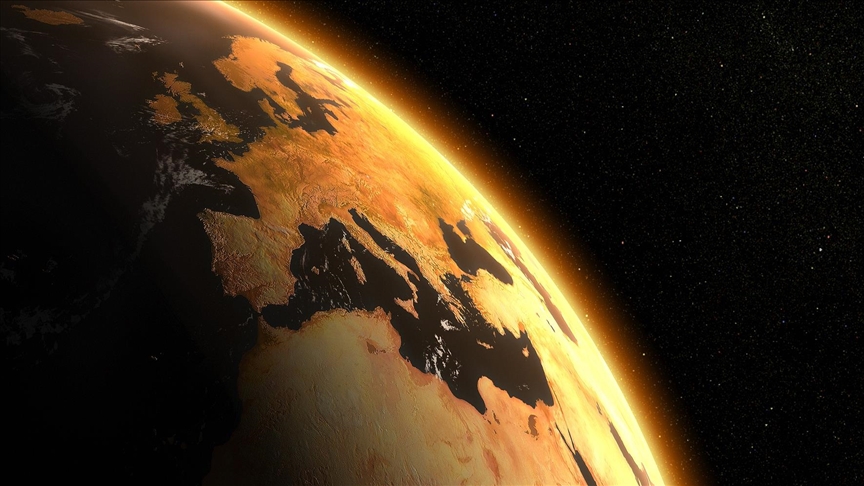Planet undergoing 'irreversible' changes from global warming: UN climate report
Report by Intergovernmental Panel on Climate Change shows that climate change is 'rapid, widespread, intensifying'

GENEVA
The scale of the world’s unprecedented current warming trend is producing irreversible changes to the planet, a sobering new UN climate report warned Monday.
The Intergovernmental Panel on Climate Change (IPCC) Working Group I report, Climate Change 2021: the Physical Science Basis, said it provides the clearest and most comprehensive assessment to date of the warming of the atmosphere, oceans and land.
"The scale of recent changes is unprecedented in thousands, if not hundreds of thousands of years," said the World Meteorological Organization (WMO), releasing the report.
"Many changes due to past and future greenhouse gas emissions are irreversible for centuries to millennia, especially changes in the ocean, ice sheets and global sea level," the WMO said.
In a statement, UN General-Secretary Antonio Guterres called the report “a code red for humanity," urging "stepped-up efforts."
"The alarm bells are deafening, and the evidence is irrefutable: greenhouse gas emissions from fossil fuel burning and deforestation are choking our planet and putting billions of people at immediate risk."
'Every region of Earth' affected
"Global heating is affecting every region on Earth, with many of the changes becoming irreversible," said the report.
The report noted that human-induced climate change is already effecting many weather and climate extremes in every region across the globe.
Evidence of observed changes in extremes such as heatwaves, heavy precipitation, droughts and the proportion of intense tropical cyclones and, in particular, their attribution to human influence has strengthened since the last IPCC assessment report in 2014.
"The harsh reality of climate change is playing out in real time before our very eyes," said WMO Secretary-General Petteri Taalas, adding: "It is a foretaste of what faces future generations."
The reports "are not comfortable" but are "a balanced view of the majority of science," he noted.
Taalas said that some of the negative changes are already locked into the climate system, but others still can be addressed if the world makes strong, rapid and sustained reductions in emissions now.
"However, greenhouse gas concentrations, especially carbon dioxide, remain at record levels," he said.
The report projects that in the coming decades, climate changes will increase in all regions.
For 1.5 C of global warming, there will be increasing heatwaves, longer warm seasons and shorter cold seasons and changes in precipitation patterns affecting flooding and drought occurrences.
At 2 C of global warming, heat extremes would more often reach critical tolerance thresholds for agriculture and health, the report said.
Extreme heat
"The extreme heat we have witnessed in 2021 bears all the hallmarks of human-induced climate change. British Columbia in Canada recorded an incredible temperature of 49.6°C – breaking all previous records – as part of an intense and extensive heatwave in North America," said Taalas.
The IPCC's meeting was to approve its following report on the physical science basis of climate change, the first part of its Sixth Assessment Report.
The meeting was held remotely, the first time the IPCC has conducted an approval session in such a format before Monday's release.
"This report has been prepared in exceptional circumstances, and this is an unprecedented IPCC approval session," IPCC Chair Hoesung Lee told the opening session of the meeting, noting there were 234 authors of the report.
"This work has required multiple series of virtual meetings across time zones, disrupting daily lives and work rhythms, especially in the most critical phase of the last 16 months as we shaped the final draft," said Lee.
More than 14,000 scientific papers are referenced in the report.
The IPCC was created in 1988 by the WMO and the United Nations Environment Program.
‘Wake-up call to the world’
Alok Sharma, a UK government minister and president of UN climate summit COP26, said the Glasgow, Scotland summit set for this November now has to be a turning point.
“If ever there was going to be a wake-up call to the world when it comes to climate change, this report is it. But the future is not yet written. The very worst of climate change is still avoidable,” he was quoted by The Guardian as saying.
He insisted that it was “still achievable” to limit global warming to 1.5 C but that this goal is “retreating and retreating fast.”
“What we really need now is for all major emitters to play their part, and the G20 are going to be absolutely key to our 1.5 C future,” he said.
“This must be the COP [summit] that consigns coal to history.”
This echoed the comments of British Prime Minister Boris Johnson.
“Today's report makes for sobering reading, and it is clear that the next decade is going to be pivotal to securing the future of our planet,” he was quoted by the BBC as saying.
“We know what must be done to limit global warming – consign coal to history and shift to clean energy sources, protect nature and provide climate finance for countries on the frontline.”
Anadolu Agency website contains only a portion of the news stories offered to subscribers in the AA News Broadcasting System (HAS), and in summarized form. Please contact us for subscription options.








